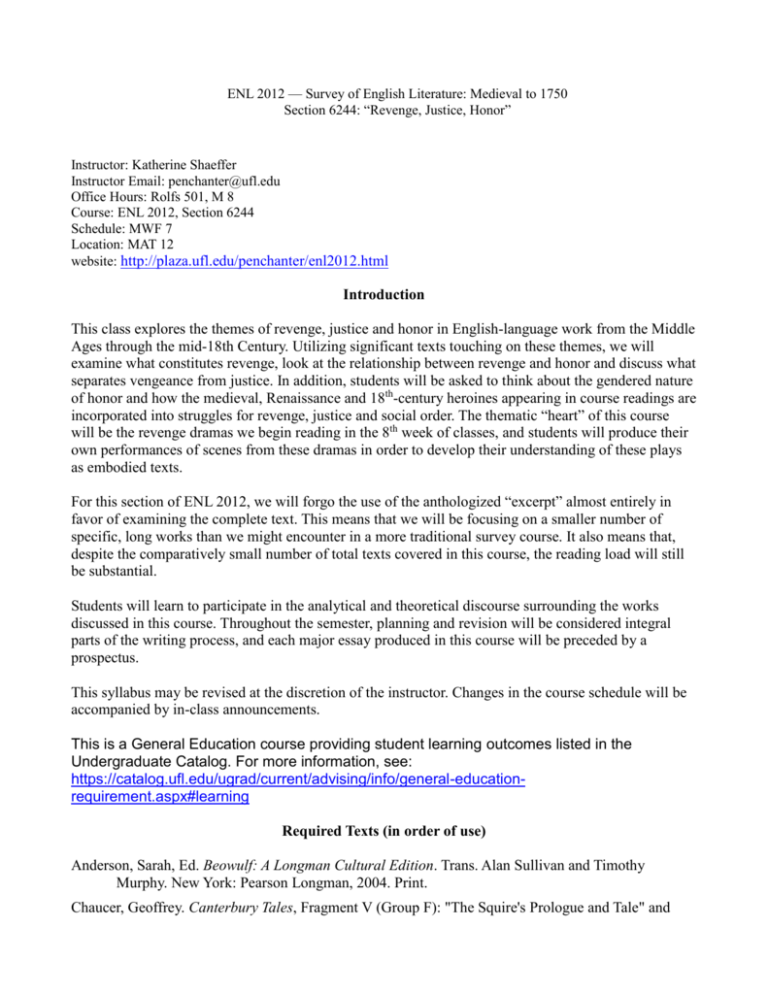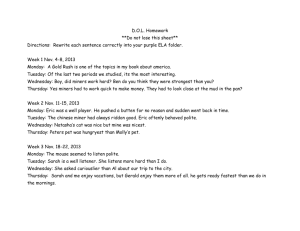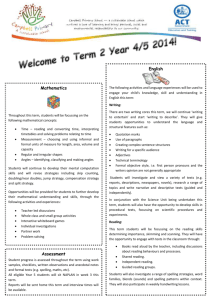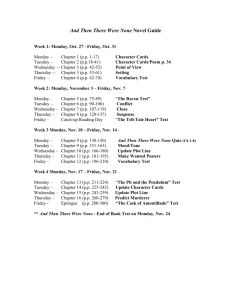
ENL 2012 — Survey of English Literature: Medieval to 1750
Section 6244: “Revenge, Justice, Honor”
Instructor: Katherine Shaeffer
Instructor Email: penchanter@ufl.edu
Office Hours: Rolfs 501, M 8
Course: ENL 2012, Section 6244
Schedule: MWF 7
Location: MAT 12
website: http://plaza.ufl.edu/penchanter/enl2012.html
Introduction
This class explores the themes of revenge, justice and honor in English-language work from the Middle
Ages through the mid-18th Century. Utilizing significant texts touching on these themes, we will
examine what constitutes revenge, look at the relationship between revenge and honor and discuss what
separates vengeance from justice. In addition, students will be asked to think about the gendered nature
of honor and how the medieval, Renaissance and 18th-century heroines appearing in course readings are
incorporated into struggles for revenge, justice and social order. The thematic “heart” of this course
will be the revenge dramas we begin reading in the 8th week of classes, and students will produce their
own performances of scenes from these dramas in order to develop their understanding of these plays
as embodied texts.
For this section of ENL 2012, we will forgo the use of the anthologized “excerpt” almost entirely in
favor of examining the complete text. This means that we will be focusing on a smaller number of
specific, long works than we might encounter in a more traditional survey course. It also means that,
despite the comparatively small number of total texts covered in this course, the reading load will still
be substantial.
Students will learn to participate in the analytical and theoretical discourse surrounding the works
discussed in this course. Throughout the semester, planning and revision will be considered integral
parts of the writing process, and each major essay produced in this course will be preceded by a
prospectus.
This syllabus may be revised at the discretion of the instructor. Changes in the course schedule will be
accompanied by in-class announcements.
This is a General Education course providing student learning outcomes listed in the
Undergraduate Catalog. For more information, see:
https://catalog.ufl.edu/ugrad/current/advising/info/general-educationrequirement.aspx#learning
Required Texts (in order of use)
Anderson, Sarah, Ed. Beowulf: A Longman Cultural Edition. Trans. Alan Sullivan and Timothy
Murphy. New York: Pearson Longman, 2004. Print.
Chaucer, Geoffrey. Canterbury Tales, Fragment V (Group F): "The Squire's Prologue and Tale" and
"The Franklin's Prologue and Tale." You may use the facing-page translations at either
www.librarius.com (http://www.librarius.com/cantales.htm) or canteburytales.org
(http://www.canterburytales.org/canterbury_tales.html) at the Electronic Literature Foundation
(ELF). If you use Librarius, start by selecting "Side-by-side translation" underneath the Squire's
Prologue and Tale in the TOC. If you use ELF, start by selecting "View Tale," "Enface MEMO" and "Squire's Prlg."
Armitage, Simon, Trans. Sir Gawain and The Green Knight. New York: W. W. Norton & Company,
2007. Print.
Webster, John. John Webster: The Duchess of Malfi and Other Plays. Ed. René Weis. Oxford: Oxford
University Press, 1996. Print.
Middleton, Thomas. Thomas Middleton: Five Plays. Eds. Bryan Loughrey and Neil Taylor. London:
Penguin Books, 1988. Print.
Cerasano, S. P. and Marion Wynne-Davies, Eds. Renaissance Drama by Women: Texts and Documents.
London and New York: Routledge, 1996. Print.
Shakespeare, William. The Tempest: A Case Study in Critical Controversy. Eds. Gerald Graff and
James Phelan. Boston and New York: Bedford/St. Martin's, 2000.
Behn, Aphra. Oroonoko: A Norton Critical Edition. Ed. Joanna Lipking. New York and London: W. W.
Norton & Company, 1997. Print.
Abelard, Peter and Héloise. The Love Letters of Abelard and Heloise. Ed. Sir Israel Gollancz and
Honnor Morten. 1901. Web. http://www.sacred-texts.com/chr/aah/index.htm or follow link from
UPenn's Online Books Page.
Pope, Alexander. "Eloisa to Abelard." Representative Poetry Online. Web.
http://rpo.library.utoronto.ca/poem/1630.html
Assignments
Close Reading Prospectus
Description: The prospectus will function as a proposal written by you to the instructor that argues for approval
of your Close Reading. If your prospectus is not “approved” by the instructor, your Close Reading will not be
accepted. The purpose of this prospectus is to encourage you to think critically and selectively about the texts we
have examined so far. Your Close Reading should (1) indicate the excerpt (or excerpts) that you plan to analyze
and (2) briefly discuss your strategy for close reading.
Length: 1-2 pages
Points Possible: 50
Due: September 2
Close Reading Essay
Description: The “Close-Reading Essay” will be your first formal essay of the semester. You will use a formal,
logical argument to analyze one aspect of one of the texts that we have explored in this class. Within those
parameters, the subject and theme of this paper are entirely up to you. Your focus can be a text's particular scene,
character, motif, etc. You will pull support for your argument primarily from within the text itself. The goal of
this assignment is to start you thinking about our readings in an analytical way.
Length: 6-8 pages
Points Possible: 250
Due: September 9
Comparative Analysis Prospectus
Description: The prospectus will function as a proposal written by you to the instructor that argues for approval
of your Comparative Analysis. If your prospectus is not “approved” by the instructor, your Comparative Analysis
will not be accepted. The purpose of this prospectus is to start you thinking beyond the level of the
compare/contrast essay. Your prospectus should include (1) a list of the texts you plan to analyze, (2) an
explanation of why you think the relationship between these two texts is significant, (3) a list of any secondary
sources you plan to use and (4) a description of your strategy for your Comparative Analysis.
Length: 1-2 pages
Points Possible: 50
Due: September 23
Comparative Analysis
Description: The “Comparative Analysis” will use a formal, logical argument to compare and analyze either (1)
two of the works we have read in class or (2) one of the works we have read in class with a related work read
outside of this class. (For example, you could compare a scene in Beowulf to a scene in Tolkien's The Hobbit or
to a clip from the movie 13th Warrior.) If you choose the second option, you will be required to run your “out of
class” reading of choice by the instructor before submitting the final version of the essay (this should alreaddy
be accomplished by your prospectus). Keep in mind that a “comparative analysis” is not just a
compare/contrast essay! A simple inventorying of similarities and differences in the two texts will not be
considered a sufficient approach to this project; you must examine the relationship between the two texts as well.
Length: 6-8 pages
Points Possible: 250
Due: October 3
Performances
Description: Students will perform a short 'scene' of choice from one of the dramatic works we will be reading
for this course. Each scene will be performed by the same group of students in two different ways, to highlight
different possible methods for interpreting the text in question. Keep in mind that you will want to give your
group a chance to rehearse outside of class, so budget your time accordingly.
Length: 5-15 minutes
Points Possible: 50
Due: October 28—Nov 4 (variable)
Prospectus for Research Paper
Description: The prospectus will function as a proposal written by you to the instructor that argues for approval
of your final research project. If your prospectus is not “approved” by the instructor, your final research project
will not be accepted. The purpose of this project is to encourage you to think about the “so what?” question that
should guide your research.
Length: 1-2 pages
Points Possible: 50
Due: November 9
Final Research Paper
Description: Your final research paper must relate to the course material in some substantial way, but other than
that it is open topic. For this paper, you are expected to exhibit your skills in the areas of rhetoric, analysis,
research and the incorporation of secondary-source criticism. The purpose of this project is to give you a chance
to showcase all that you have learned in this class throughout the semester.
Length: 8-12 pages
Points Possible: 300
Due: December 7
Total Points Possible: 1000
Grading Policies and Procedures
To get an "A" in this course, you must:
Complete all course assignments in a timely manner.
Submit assignments with few to no grammatical and spelling errors.
Consistently participate in in-class discussions.
Be courteous to the other participants in the class.
Produce high-quality work throughout the course.
Have no more than 3 periods of unexcused absences for the term.
"A-" work will meet most, but not all, of the requirements for getting an "A."
To get a "B" in this course, you must:
Complete all course assignments in a timely manner.
Submit assignments with few grammatical and spelling errors.
Participate in most in-class discussions.
Be courteous to the other participants in the class.
Produce satisfactory work throughout the course.
Have no more than 4 unexcused absences for the term.
"B-" work will meet most, but not all, of the requirements for getting a "B."
To get a "C" in this course, you must:
Complete most course assignments in a timely manner.
Participate in some in-class discussions.
Be courteous to the other participants in the class.
Produce satisfactory work throughout the course.
Have no more than 5 unexcused absences for the term.
"C-" work will meet most, but not all, of the requirements for getting a "C."
To get a "D" in this course, you must:
Follow the UF Student Honor Code (i.e. not plagiarize)
Have no more than 6 periods of unexcused absences for the term.
Participate in some in-class discussions.
Be civil to the other participants in the class.
Earn enough "points" in your coursework to avoid an "E" score.
A
Grade Equivalencies
92-100
A-
90-91
B+
88-89
B
82-87
B-
80-81
C+
78-79
C
72-77
C-
70-71
D+
68-69
D
62-67
D-
60-61
E
59 or less
Absence and Tardiness Policies
You get 3 “free” absences for this course. You can be absent from any class, for any reason, without it affecting
your final grade. After that, each absence will drop your score for the course by one full letter grade.
Students participating in UF-sponsored events (actors, musicians, athletes, etc.) will be excused for those events,
but they must make up the work in their own time.
In-class discussion is a vital component of this course, so prolonged absences, even for medical reasons, will not
be excused.
Since each class is only one period, any student arriving to class more than 20 minutes late will be counted as
“absent” for that day.
If you are consistently late to class by any amount of time, it will negatively affect your final grade.
Final Grade Appeals
In 1000- and 2000- level courses, students may appeal a final grade by filling out a form available from Carla
Blount, Program Assistant.
Please keep in mind that grade appeals may result in a higher, unchanged, or lower final grade.
Week 1
Monday Aug 22: Introduction
Wednesday Aug 24: Beowulf: Read Translators' Introduction (xvii-xx), “Reading Beowulf” (124-137) and Part
I. Grendel (to line 543)
Friday Aug 26: Beowulf: Finish Part I. Grendel
Week 2
Monday Aug 29: Beowulf: Read Part II. Grendel's Mother (to line1456)
Wednesday Aug 31: Beowulf: Finish Part II. Grendel's Mother
Friday Sept 2: Beowulf: Read Part III. The Dragon (to line 2256); Close Reading Prospectus Due
Week 3
Monday Sept 5: HOLIDAY. NO CLASSES.
Wednesday Sept 7: Beowulf: Finish Part III. The Dragon
Friday Sept 9: Read excerpt from Tolkien's The Hobbit or LOTR (handout); Close Reading Due
Week 4
Monday Sept 12: Read Chaucer's Canterbury Tales, the Squire's “Prologue” and “Tale”
Wednesday Sept 14: Read Chaucer's Canterbury Tales, “The Words of the Franklin and The Host” and the
Franklin's “Prologue” (You may also want to start the Franklin's “Tale,” which we will discuss on Friday.)
Friday Sept 16: Read Chaucer's Canterbury Tales, the Franklin's “Tale”
Week 5
Monday Sept 19: Sir Gawain and the Green Knight “Introduction,” “A Note on Middle English Meter,” “About
the Gawain Poet” and Fitt I
Wednesday Sept 21: Sir Gawain and the Green Knight Fitt II
Friday Sept 23: Sir Gawain and the Green Knight Fitt III; Comparative Analysis Prospectus Due
Week 6
Monday Sept 26: Sir Gawain and the Green Knight Fitt IV
Wednesday Sept 28: Sir Gawain and the Green Knight Discussion & Review
Friday Sept 30: Read Sir Gawain and the Green Knight Adaptations & Descendents
Week 7
Monday Oct 3: Comparative Analysis Due
Wednesday Oct 5: Read The Tragedy of Antonie (Intro, Acts I and II)
Friday Oct 7: Finish The Tragedy of Antonie (Acts III and IV)
Week 8
Monday Oct 10: Read The Tragedy of Mariam (Intro, Acts I and II)
Wednesday Oct 12: Finish The Tragedy of Mariam (Acts III and IV)
Friday Oct 14: Read “The Authorship of The Revenger's Tragedy” in Thomas Middleton: Five Plays and The
Revenger's Tragedy (Acts I and II)
Week 9
Monday Oct 17: Finish The Revenger's Tragedy (Acts III-V)
Wednesday Oct 19: Read Webster's The Duchess of Malfi (Acts I and II), “Introduction” and “A Note on the
Texts”
Friday Oct 21: Finish Webster's The Duchess of Malfi (Acts III-V)
Week 10
Monday Oct 24: Read Shakespeare's The Tempest (Acts I and II) and Aimé Césaire's excerpt from A Tempest;
Examine “Sources and Contexts”
Wednesday Oct 26: Read Shakespeare's The Tempest (Acts III-V), Brown's “This Thing of Darkness I
Acknowledge Mine” and Loomba's excerpt from Gender, Race, Renaissance Drama
Friday Oct 28: PERFORMANCES + Discussion
Week 11
Monday Oct 31: PERFORMANCES + Discussion
Wednesday Nov 2: PERFORMANCES + Discussion
Friday Nov 4: PERFORMANCES + Discussion
Week 12
Monday Nov 7: Read Behn's Oroonoko (Preface and pp. 5-30, to “there arriv'd in the Port an English Ship”)
Wednesday Nov 9: Finish Behn's Oroonoko; Read excerpts from Southerne's Oroonoko: A Tragedy; Final
Paper Prospectus Due
Friday Nov 11: HOLIDAY. NO CLASSES.
Week 13
Monday Nov 14: Watch Greenaway's Prospero's Books, Taymor's The Tempest or Cox's Revenger's Tragedy (to
be decided by the class, as a class). In class clip + Discussion
Wednesday Nov 16: In class clip + Discussion
Friday Nov 18: In class clip + Discussion
Week 14
Monday Nov 21: EVALUATIONS. Read Love Letters of Abelard & Heloise (Letter I: “Abelard to Philintus”)
Wednesday Nov 23: Read Love Letters of Abelard & Heloise (Letter II: “Heloise to Abelard”) and Pope's
“Eloisa to Abelard”
Friday Nov 25: THANKSGIVING HOLIDAY. NO CLASSES.
Week 15
Monday Nov 28: CONFERENCES
Wednesday Nov 30: CONFERENCES
Friday Dec 2: CONFERENCES
Week 17
Monday Dec 5: CONFERENCES
Wednesday Dec 7: FINAL PAPER DUE.
University Policies and Requirements
Statement of Composition (C) and Humanities (H) credit.
This course can satisfy the UF General Education requirement for Composition or Humanities. For more
information, see: https://catalog.ufl.edu/ugrad/current/advising/info/general-education-requirement.aspx
Statement of Writing requirement (WR)—formerly Gordon Rule.
This course can provide 6000 words toward fulfillment of the UF requirement for writing. For
more information, see:
https://catalog.ufl.edu/ugrad/current/advising/info/gordon.aspx
Statement of Student Disability Services
The Disability Resource Center in the Dean of Students Office provides information and
support regarding accommodations for students with disabilities. For more information, see::
http://www.dso.ufl.edu/drc/
Statement on Harassment
UF provides an educational and working environment that is free from sex discrimination and
sexual harassment for its students, staff, and faculty. For more about UF policies regarding
harassment, see: http://www.dso.ufl.edu/sccr/sexual/
Academic Honesty
All students must abide by the Student Honor Code. For more information about academic
honesty, including definitions of plagiarism and unauthorized collaboration, see:
http://www.dso.ufl.edu/sccr/honorcodes/honorcode.php
Grade Point Equivalencies
UF has recently instituted minus grades. As a result, letter grades now have different grade point equivalencies.
For more information, see: http://www.registrar.ufl.edu/catalog/policies/regulationgrades.html






